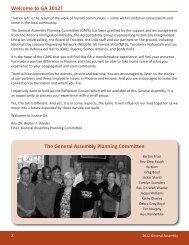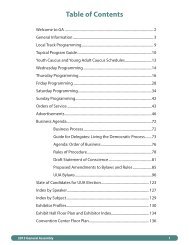Topical Program Guide - Unitarian Universalist Association of ...
Topical Program Guide - Unitarian Universalist Association of ...
Topical Program Guide - Unitarian Universalist Association of ...
Create successful ePaper yourself
Turn your PDF publications into a flip-book with our unique Google optimized e-Paper software.
Statement <strong>of</strong> ConscienceAgenda4041424344454647484950Economic factors are currently the primary driving force underlying immigration worldwide. Economic factorsthat cause people to migrate include the inability to meet needs for sufficient food and adequate shelter andto better their lives. Contributors to these economic conditions include population growth, environmentaldegradation, globalization, and policies that address land ownership, tariffs, trade, and working conditions,many <strong>of</strong> which are continuing legacies <strong>of</strong> imperialism and colonialism.A mechanism for implementing immigration laws is the issuance <strong>of</strong> visas, which are legal documents givingpermission to enter and stay in a nation for a period <strong>of</strong> time. When the supply <strong>of</strong> visas is far below the demand,then pressure to enter a country illegally or overstay a visa increases. A similar pressure occurs when thelength <strong>of</strong> time between applying for a permanent visa and its issuance is a matter <strong>of</strong> years. When peoplecannot obtain or renew visas but choose to enter or remain in a country anyway, they become undocumentedimmigrants.515253545556575859606162636465666768697071727374757677787980818283848586Visas that allow multiple border crossings encourage people to visit families knowing that they can return andwork. When crossing a border is difficult or hazardous, the likelihood <strong>of</strong> returning to one’s family decreasesand the desire to send for one’s family increases. The families <strong>of</strong> undocumented immigrants wanting to reunitewith their loved ones also have no means <strong>of</strong> entering legally. A broken immigration system opens the way forillegality, human trafficking, and exploitation.ConsequencesWho migrates, how they migrate, where they migrate, and when they migrate are central to immigrationpolicies worldwide. While immigrants find jobs, build community, fall in love, have children, and in otherways enrich a country with new ways <strong>of</strong> thinking and being, some citizens and national policies declare them“illegal” and unwelcome.Lack <strong>of</strong> documentation and legal status can lead to exploitation. Work visas <strong>of</strong>ten require having an employersponsor,which can limit a person’s freedom to change employment. Some employers seeking workers areunable to find people willing to do certain jobs under the work conditions and at the wages they <strong>of</strong>fer. Otheremployers are stymied by onerous requirements to prove a need for people with certain abilities. When thenumber <strong>of</strong> work visas is less than the economy’s demand for labor, employers will fill the need regardless <strong>of</strong>workers’ documentation.Undocumented immigrants are <strong>of</strong>ten denied the civil rights protections <strong>of</strong> citizens, paid less than citizens,and labor in unsafe and unhealthy conditions. In the United States, increased border security has resultedin undocumented immigrants crossing in more dangerous and remote areas where basic human needssuch as drinking water are nonexistent. Increased enforcement <strong>of</strong> immigration laws has led to creatingdetention centers, some <strong>of</strong> which are privately run for pr<strong>of</strong>it motives. These centers are poorly regulated and<strong>of</strong>ten overcrowded. Essential needs including medical attention are <strong>of</strong>ten denied, while more cost effectiveand humane measures are ignored. Immigration enforcement consumes increasingly more <strong>of</strong> the federalgovernment’s resources.Many undocumented immigrants and their families live in constant fear <strong>of</strong> deportation. This fear affects use<strong>of</strong> educational opportunities, health care, and police protection. Enlisting local law enforcement agenciesin immigration enforcement violates accepted practices <strong>of</strong> community policing and erodes trust betweenpolice and the communities they serve, sometimes resulting in racial pr<strong>of</strong>iling <strong>of</strong> those who appear foreign.When deportation occurs, the result is destroyed dreams and broken families—partners separated andchildren taken away from their caregivers or forced to return to a place they do not know. The perceived andconstructed threat <strong>of</strong> those who are different has led some individuals and nations to meet immigrants withfear. Fear has become a social and political force that incorrectly labels people as “illegals,” “criminals” and“terrorists.”Therefore“Immigration policy should be generous; it should be fair; it should be flexible. With such a policy we canturn to the world, and to our own past, with clean hands and a clear conscience.” - John F. Kennedy87Our <strong>Unitarian</strong> <strong>Universalist</strong> (UU) Principles and Sources compel us to affirm that all immigrants, regardless <strong>of</strong>82 2013 General Assembly






